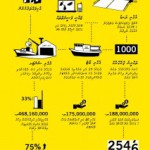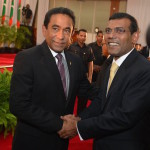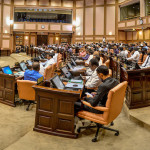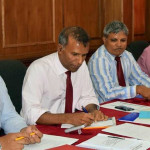The Maldivian Democratic Party (MDP) unveiled its higher education policy in simultaneous events across 19 islands and two cities on Friday (June 14), pledging to raise the enrolment rate from six percent of school leavers to 40 percent in the next five years.
Launching the policy in the island of Naifaru in Lhaviyani atoll, former President Mohamed Nasheed said that the MDP’s objective was to usher in “a golden age” for higher education in the Maldives.
“We cannot let students finish their education after they complete O’ Levels. A student who wants to pursue higher education, even if he barely passed, will have that opportunity,” the MDP presidential candidate said.
The government would allocate MVR 500 million (US$ 32.5 million) in five years to issue student loans, provide scholarships and conduct training programmes, Nasheed said.
He added that island councils would be tasked with assessing the types of scholarships and higher education opportunities most needed for development of the island.
The Maldives shares its six percent enrolment with Somalia and Bangladesh, while developed countries such as South Korea have a rate higher than 90 percent. Neighbouring Sri Lanka meanwhile has a 15 percent enrolment in post-secondary education.
The MDP proposes in its sixth “mini-manifesto” to introduce an education fund, provide student loans with long-term repayment schemes, open new universities, colleges and institutes with campuses across the country, and conduct skills training programmes.
The party’s policy targets include the construction of two hostels or dormitories in the Male’ region, improving the Islamic studies faculty, establishing an Information Technology College, and setting up institutes for boat building, maritime training, medicine, fisheries and sports under public-private partnership (PPP) projects.
Other targets include inaugurating an education savings scheme with the government to match deposits by parents, providing plots of land to private education institutes, giving grants for financially-disadvantaged students, securing opportunities for 2,000 students to study medicine, covering course fees for students with special needs and issuing MVR 118 million (US$ 7 million) worth of student loans from a development bank during the next five years.
According to the policy, the monthly repayment for the student loans would not exceed eight percent of a borrower’s monthly income.
Moreover, the policy proposes upgrading the polytechnic institute to ISO 900 standard and establishing new faculties at the National University.
In addition to the proposed higher education opportunities, the policy also includes special projects to train 300 science teachers, 300 Quran teachers, 500 nurses and 200 pharmacists as well as an MVR 80 million programme for the improvement of lecturers.
The ‘Hunaru‘ skills training programme meanwhile targets the creation of 17,350 jobs.
On the MDP’s achievements during its three years in government, the mini-manifesto noted that the country’s first national university was inaugurated in February 2011, the first national polytechnic institute was opened in April 2010, a research center was established in Faafu Magoodhoo in collaboration with Italy’s Milano-Bicaco University, a TIVET (technical and vocational education training) authority was set up, a ‘Hunaru’ programme was commenced to train 8,500 workers in late 2011 and four private colleges were registered.
In addition, the government resumed work on a new building for the National University’s hospitality faculty, opened a hostel at the Kulhudhufushi campus, issued student loans worth MVR 300 million, facilitated significant increases in the number of scholarships offered by friendly nations, secured more than 60 tuition-free scholarships from the Bangalore Garden City College and compiled a report with World Bank aid on proposals for providing opportunities for post-secondary education.
Last week, President Dr Mohamed Waheed pledged to establish a housing policy for the people of Male’ as part of his campaign for the upcoming presidential election.







i wonder from where the hell he is going to get all these money to full fill his pledges ?
This guy in 2008 , promised that he will bring USD 350 million within 7 days from taking office ? But that was a just a smoke and nothing happened ?
How can he promised to let a student peruse her education even if barely passed ? What kind of quality education he is talking about here ?
It is not important to have people enrolled in and get them fooled with this kind of stupid and misleading promises.
It is better that he start to make a promises for those school leavers who were not very successful in thier studies to find the better alternatives instead of making them to be blinded and again to go for higher studies.
Find and offer alternative skilled building programs which might be more successful and productive for the people and its community.
Now this promise is just because those students may be now possible to vote in the upcoming election and then this must be the different tactics to drag those votes.
This guy will do anything to win then election and he will never be a good leader who will take care of the people and our country.
That's fantastic, President Nasheed. Exceeded my expectations. And well done President Nasheed for your achievements in expanding higher education during the short time you were our President.
Power to the people. Democracy in action. Well done MDP.
Instead of all this nonsense, what we need is more training in Islam. Madrassas with mullahs, Quran reciters with golden crowns, jihad training in Pakistan - isn't this what is needed for a succesful life in this world and the next? As for girls they should be homeschooled in the art of cooking, cleaning, child-rearing and pleasing their husbands. Our future depends on these girls who will bring up Allah-fearing mujahids to fight for the Ummah and conquer the infidel lands.
You got my vote!
1.If you read this article more carefully you will see that the manifesto includes skills training. The HUNARU programme that President Nasheed launched in 2011 was aimed at providing the alternative skills training that you have suggested here.
2.There are many ways to support a student who has failed at secondary school or barely passed as you say here to continue to further education. They can do a foundation course, that will allow them to enter tertiary education, they could re-sit exams they have failed, or they can join a laddered skills training programme which will allow them to enter a tertiary education facility once they have completed Certificate level 4 if they wish to.
3.Maybe you should go to the press conference when they launch the manifesto to ask your questions about the funding. But I would like to draw your attention to the key words here: public private partnerships. This is where the industry and the private sector in education partners government in providing quality programme delivery. You may want to look up ITOs Industry Training Organisations where industry takes on training of people under apprentice programmes.
4.As I have said in earlier comments, you appear to be so focussed in rubbishing President Nasheed that you seem not to see anything good in what he does. I would like to hear from you why only 6% of the population have had post secondary and higher education in the Maldives at the end of 2008 .
@ Kuribee
1.If you read this article more carefully you will see that the manifesto includes skills training. The HUNARU programme that President Nasheed launched in 2011 was aimed at providing the alternative skills training that you have suggested here.
2.There are many ways to support a student who has failed at secondary school or barely passed as you say here to continue to further education. They can do a foundation course, that will allow them to enter tertiary education, they could re-sit exams they have failed, or they can join a laddered skills training programme which will allow them to enter a tertiary education facility once they have completed Certificate level 4 if they wish to.
3.Maybe you should go to the press conference when they launch the manifesto to ask your questions about the funding. But I would like to draw your attention to the key words here: public private partnerships. This is where the industry and the private sector in education partners government in providing quality programme delivery. You may want to look up ITOs Industry Training Organisations where industry takes on training of people under apprentice programmes.
4.As I have said in earlier comments, you appear to be so focussed in rubbishing President Nasheed that you seem not to see anything good in what he does. I would like to hear from you why only 6% of the population have had post secondary and higher education in the Maldives at the end of 2008
Giving a second chance is always a good idea. Those who manage to pass their exams should be given the chance of either continuing their education or finding vocational alternatives. The policies sound good.
However, I'm not convinced that building extra hostels around Male is such a good idea. What happened to decentralisation? Make every effort to disburse the population of Male instead of trying to further concentrate it! Face the facts; Male is a slum! Don't make it any worse.
It is a waste to spend money in the name of education to some close minded people who blindly follow myths and folklore of ancient people. How can you educate people who don’t believe in science and have no ability to grasp the conception of universe and the laws of nature? It is better to spend all this money to make these primitives better fishermen.
@moron on Sun, 16th Jun 2013 11:04 PM
"It is a waste to spend money in the name of education to some close minded people who blindly follow myths..."
They are close minded as a result of a lack of a good education. A good education opens up and broadens the mind. It will also ensure that people do not fall for the sick propaganda from politicians and extremists of all kinds.
Wonder why the pledge includes 300 Quruan teachers. Coming from the die-hard-devil-may-care Secular camp this reeks of dishonesty at grand scale! These same people when in power tried to introduce french and German languages to school curriculum when parents asked for Arabic to include in school curriculum.
The paper is just a paper, it doesn't reflect what people need, or what is good for the country or any such thing. But its good to provoke discussion. However the type of people who are commenting in this thread gives away the measure of intellectual capacity of our local gang of kuffar.
@moron
Your comments reflect the close- mindedness that you speak of. Perhaps you were one of the many people who were denied a quality education during the administration of HE Maumoon Abdul Gayoom?
@ moron
Why would you call yourself a moron?
What is the point of the very last paragraph?
It would be also nice to have enough well paying jobs created by then to accomodate all those graduates. Coz we are already having trouble findind jobs for educated, experienced and well trained people over the past 5 years.
DO they have any intentions of resuming previous work such as the environment related degree programs, and possible job opportunity developments